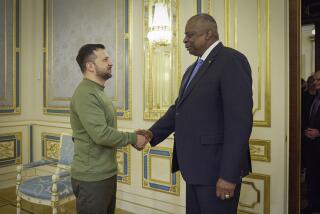Rumsfeld Encounters Friendly Fire
WASHINGTON — Anxious troops awaiting deployment to Iraq peppered Defense Secretary Donald H. Rumsfeld with questions Wednesday during his brief visit to their camp in the Kuwaiti desert, demanding to know why U.S. forces were still being sent with insufficient protection against deadly insurgents.
Rumsfeld, who invited “tough questions,” got what he asked for when a number of the troops took him to task for the poor condition of the equipment given to the National Guard and for the Pentagon’s “stop-loss” policy that had kept thousands of troops on active duty beyond their discharge dates.
During the meeting at Camp Buehring, one soldier asked Rumsfeld why some troops had to rummage through local landfills for scraps to armor their vehicles.
“Our vehicles are not armored. We’re digging pieces of rusted scrap metal and compromised ballistic glass to put on our vehicles to take into combat,” said one Iraq-bound soldier, whom Associated Press identified as Spc. Thomas Wilson of the Tennessee National Guard.
“We do not have proper armored vehicles to carry with us north,” Wilson said as comrades cheered his question.
Rumsfeld responded that the Pentagon had taken steps to equip soldiers being sent to Iraq, but that factory production was limited. “It’s essentially a matter of physics. It isn’t a matter of money. It isn’t a matter on the part of the Army of desire. It’s a matter of production and capability of doing it.”
The insurgency in Iraq, Rumsfeld said, has forced the Pentagon to shift its priorities toward outfitting every vehicle in Iraq with proper armor, something planners had not seen as a necessary expense before the U.S.-led invasion in March 2003.
“As you know, you go to war with the army you have,” Rumsfeld said. “They’re not the army you might want or wish to have at a later time.”
Rumsfeld frequently meets with troops when he visits combat zones, and he has faced questioning before from soldiers on matters such as delinquent pay and the length of deployments. But Wednesday’s session was somewhat more combative than previous meetings and reflected soldiers’ anxiety, particularly about their equipment.
Pentagon planners and supply experts have acknowledged that the failure to anticipate a sustained insurgency resulted in shortages of necessary equipment. The troops Wednesday pressed Rumsfeld for solutions.
“My question is, what is the Department of Defense, more specifically the Army side of the house, doing to address shortages and antiquated equipment that National Guard soldiers are going to roll into Iraq with?” one soldier asked.
Rumsfeld said he had been assured by commanders that there was no double standard between active duty and reserve troops in terms of quality of equipment, and that the best gear was going to those troops likely to see the most combat.
The soldiers’ complaints were likely to bolster critics of the Bush administration who argue that the Pentagon was ill prepared for the bloody insurgency that has claimed the lives of more than 1,000 U.S. troops.
Several Democrats in Congress criticized Rumsfeld’s remarks as callous. Sen. Christopher J. Dodd (D-Conn.) released a letter to Rumsfeld, saying he was “disturbed” by the secretary’s response to the soldiers, calling it “utterly unacceptable.”
“Mr. Secretary, our troops go to war with the army that our nation’s leaders provide,” Dodd wrote. “Our military should spare no expense to ensure the safety of our troops.”
Pentagon spokesman Lawrence Di Rita later sought to downplay the confrontation at the meeting, saying the pointed questions were just a small part of an overwhelmingly positive visit.
Di Rita lauded the U.S. war effort for adapting to the insurgency and ratcheting up production of armored Humvees. Three of four Humvees in Iraq now are properly armored, he said.
“When the country’s at war, the war begins and then we start to mobilize, and this is a perfect example of the kind of mobilization that took place.”
As Iraq’s insurgency gathered momentum during the summer of 2003, large gaps in the military’s supply system were revealed, and plants could not keep up with requests by commanders in Iraq for armored vehicles and body armor.
It took the Pentagon nearly a year after President Bush declared an end to “major combat operations” on May 1, 2003, to equip all soldiers with protective plates for their protective vests. War planners had initially equipped only “front line” units with the plates. But militants made it clear that any location could become a battle zone.
The equipment problems were underscored in October when an Army Reserve supply unit south of Baghdad disobeyed a direct order to deliver fuel and other supplies to a base in northern Iraq. After an investigation into the incident, 23 members of the unit were given nonjudicial punishments, which could entail a reduction in rank and loss of pay.
Army officials said the time it took to get crucial equipment to the battlefield had dropped from a peak of 53 days a year ago to about 24 days in September. Yet the persistent insurgency still hampered the resupply effort.
A recent Army “Equipment Stress Study” estimated that it would cost about $9.6 billion annually to address the normal wear and tear on trucks and tanks.
More to Read
Start your day right
Sign up for Essential California for news, features and recommendations from the L.A. Times and beyond in your inbox six days a week.
You may occasionally receive promotional content from the Los Angeles Times.






